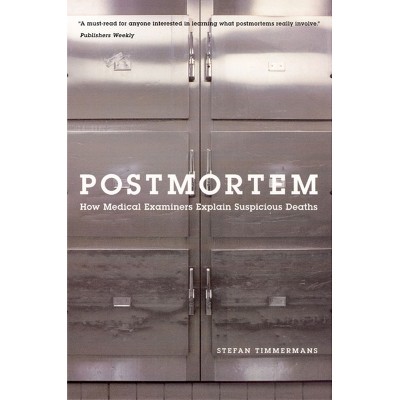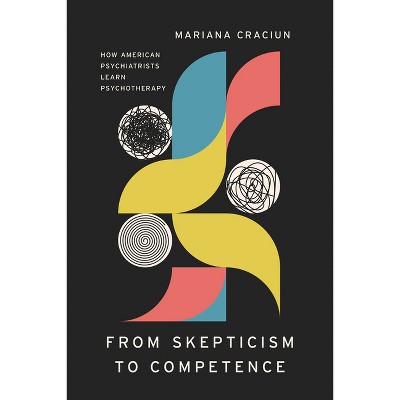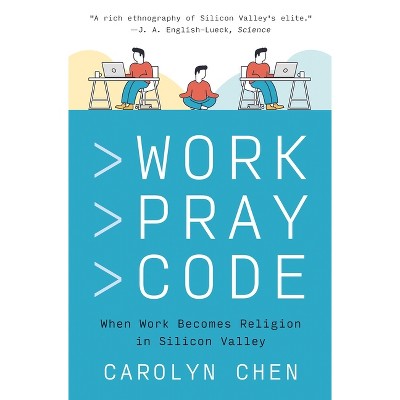Sponsored

Code of the Suburb - (Fieldwork Encounters and Discoveries) by Scott Jacques (Paperback)
$28.99
In Stock
Eligible for registries and wish lists
Sponsored
About this item
Highlights
- When we think about young people dealing drugs, we tend to picture it happening on urban streets, in disadvantaged, crime-ridden neighborhoods.
- About the Author: Scott Jacques is assistant professor of criminal justice and criminology in the Andrew Young School of Policy Studies at Georgia State University.
- 208 Pages
- Social Science, Sociology
- Series Name: Fieldwork Encounters and Discoveries
Description
About the Book
"Code of the Suburb" explores the world of young, middle-class, suburban drug dealers as seen through the eyes of a group of dealers themselves. What leads these adolescents to start selling? How do they conduct business? What problems do they face? How do they handle those problems? Why do they quit? The authors have done fieldwork with a group of high-school students from a nearly all-white prosperous suburb of Atlanta, a boringly conventional place where the most obvious social problems are barking dogs and speeding teenagers. They find that suburban kids who sell drugs are no strangers to conflict. Like their urban counterparts, their illicit activities put them beyond the realm of police protection and this makes them vulnerable to predators.Urban drug markets exhibit high rates of violence because the individuals involved subscribe to "the code of the street"a set of informal rules governing interpersonal behavior that emerges from the circumstances that characterize disadvantaged communities in American cities (Elijah Anderson s "Code of the Street" is a prime cite). For drug market participants who abide by this code, violent vengeance is a means to the ends of respect, status, and security. And so the authors build their case that suburban drug markets are generally more peaceful than their urban counterparts, on the assumption a theory of why violence does "not" occur has implications for explaining why it does. This book undertakes to study drug market peace rather than drug market violence. The code of the suburb emerges here as a set of informal rules governing interpersonal behavior that emerges from advantaged communitiesa lack of street life, weak ties between community members, and social advantage (high employment, education, family life, freedom from pervasive/discriminatory law enforcement). In brief, the code looks like this: (1) conflict is embarrassing, lowers one s status, and damages identity; (2) thus, conflict should be prevented, or, when it does occur, quickly halted; therefore, (3) confrontational approaches to conflict managementespecially violent retaliationare bad; and (4) non-confrontational approaches to social control (like toleration, avoidance, and negotiation) are good. Suburban people, the code says, should be non-confrontational, law-abiding, private, and productive. Key components of suburban drug marketsprivate and fair trade, concern for conflict prevention, and peaceful conflict managementall are shaped by the code of the suburb: avoid embarrassment, raise status, and maintain the identity of good person. "Book Synopsis
When we think about young people dealing drugs, we tend to picture it happening on urban streets, in disadvantaged, crime-ridden neighborhoods. But drugs are used everywhere-even in upscale suburbs and top-tier high schools-and teenage users in the suburbs tend to buy drugs from their peers, dealers who have their own culture and code, distinct from their urban counterparts. In Code of the Suburb, Scott Jacques and Richard Wright offer a fascinating ethnography of the culture of suburban drug dealers. Drawing on fieldwork among teens in a wealthy suburb of Atlanta, they carefully parse the complicated code that governs relationships among buyers, sellers, police, and other suburbanites. That code differs from the one followed by urban drug dealers in one crucial respect: whereas urban drug dealers see violent vengeance as crucial to status and security, the opposite is true for their suburban counterparts. As Jacques and Wright show, suburban drug dealers accord status to deliberate avoidance of conflict, which helps keep their drug markets more peaceful-and, consequently, less likely to be noticed by law enforcement. Offering new insight into both the little-studied area of suburban drug dealing, and, by extension, the more familiar urban variety, Code of the Suburb will be of interest to scholars and policy makers alike.Review Quotes
"Code of the Suburb provides real-life evidence to support criminological concepts and theories such as the failure of informal social control, drift, and differential association. It addresses how racial factors play a role, and how female youths are missing in the big picture. . . . The authors provide here a good start to bridging the gap between the guesswork and reality of the middle-class drug economy. It is a particularly important book for social science researchers to grasp in amending the prevalent view of the dark figure of youth crime."-- "Criminal Law and Criminal Justice Books"
"Jacques and Wright succeed at providing an intriguing description of an understudied population of drug dealers without resorting to embellishment or exaggeration. Their straightforward account of 'suburban coolness' is enriched with a theoretically informed comparative analysis drawing attention to differences between urban and suburban drug dealing and deftly exposing micro- and macro-level structural inequalities. The valuable contribution this book offers to social scientists and students interested in drugs and crime is apparent in the last chapter, but the first seven chapters provide the unique insights into middle-class drug dealing that make this contribution significant. . . . Few books offer insight on drug dealing in middle-class suburban environments. Code of the Suburb provides the contrast needed for a more in-depth understanding of the structural, social, and cultural distinctions between 'the pursuit of coolness' and 'in search of respect.'"-- "Contemporary Sociology"
"Jacques and Wright's Code of the Suburb provides a very up close and personal look into the lives of several adolescent drug dealers. These personal interviews allow the reader to understand and recognize the real reasons these youth proceed into drug dealing, along with evidence and theories provided by Jacques and Wright that further support these notions. This book describes a community that some of America would probably wish to ignore, as it could be viewed as a mere blemish on our perfectly constructed society. However, it is critical that we recognize and research all facets of our society to better our understanding of adolescents and what motivates them to harm or contribute to society."-- "Journal of Youth and Adolescence"
"Code of the Suburb takes us into the world of young white suburban drug dealing and in doing so, provides a fascinating and powerful counterpoint to the devastation of the drug war in poor, minority communities. To readers familiar with that context, the absence of police and prisons--indeed, of virtually any negative consequences for selling and using drugs--is quite striking."-- "Alice Goffman, author of On the Run"
"If you think adolescent drug dealing invariably leads to trouble with the law, you should read this book. If you think drug dealing promotes violence, you should read this book. If you think drug dealing is for antisocial 'losers, ' read this book. You will learn that selling drugs in suburbia confers social status, rarely involves legal risk or violence, and need not disrupt conventional academic and career paths. In a word, you will learn why so many American middle-class kids think drug selling is cool."--Richard Rosenfeld, "Founders Professor of Crimonology and Criminal Justice, University of Missouri-St. Louis"
"Long interested in the exotic 'other, ' criminologists typically focus on trying to understand urban crime problems and neglect those occurring in boring, white suburbs. Yet, with its manicured lawns and American flags flying, suburbia is so obviously artificial that it surely is masking something worthy of the criminologist's gaze. In this fascinating book, Jacques and Wright get behind the picket fences and gated communities and help us understand suburbia in an entirely new light. It is sure to become a classic in 'suburban studies.'"-- "Shadd Maruna, Dean and Professor, Rutgers School of Criminal Justice"
"With the advent of self-report surveys in the 1940s and 1950s, social scientists learned that delinquent activity was fairly common among white, middle class, suburban youth. However, not much was ever made of the finding for our understanding of suburban life. In Code of the Suburb, Jacques and Wright explore drug dealing in a middle class suburb and in doing so shift our conceptual lens away from popular images captured in The Wire. Drawing on a series of rich qualitative interviews with thirty young suburban drug dealers, Jacques and Wright uncover surprising similarities between white, suburban, middle class dealers and their black, urban, lower class counterparts. But differences between the two groups are stark, especially regarding victimization, use of violence, and encounters with legal authorities such as the police. For social scientists studying race, class, and drug dealing, I strongly urge you to include this book on your must read list."-- "John H. Laub, University of Maryland, former director, National Institute of Justice"
About the Author
Scott Jacques is assistant professor of criminal justice and criminology in the Andrew Young School of Policy Studies at Georgia State University. Richard Wright is professor of criminal justice and criminology in the Andrew Young School of Policy Studies at Georgia State University.Dimensions (Overall): 8.9 Inches (H) x 6.0 Inches (W) x .5 Inches (D)
Weight: .65 Pounds
Suggested Age: 22 Years and Up
Number of Pages: 208
Genre: Social Science
Sub-Genre: Sociology
Series Title: Fieldwork Encounters and Discoveries
Publisher: University of Chicago Press
Theme: Urban
Format: Paperback
Author: Scott Jacques
Language: English
Street Date: May 8, 2015
TCIN: 1006093280
UPC: 9780226164113
Item Number (DPCI): 247-33-3386
Origin: Made in the USA or Imported
If the item details aren’t accurate or complete, we want to know about it.
Shipping details
Estimated ship dimensions: 0.5 inches length x 6 inches width x 8.9 inches height
Estimated ship weight: 0.65 pounds
We regret that this item cannot be shipped to PO Boxes.
This item cannot be shipped to the following locations: American Samoa (see also separate entry under AS), Guam (see also separate entry under GU), Northern Mariana Islands, Puerto Rico (see also separate entry under PR), United States Minor Outlying Islands, Virgin Islands, U.S., APO/FPO
Return details
This item can be returned to any Target store or Target.com.
This item must be returned within 90 days of the date it was purchased in store, shipped, delivered by a Shipt shopper, or made ready for pickup.
See the return policy for complete information.
Frequently bought together

$11.37 - $16.50
MSRP $18.99 - $30.00
4.4 out of 5 stars with 23 ratings
Trending Non-Fiction


$18.28
was $19.58 New lower price
4.7 out of 5 stars with 17 ratings















